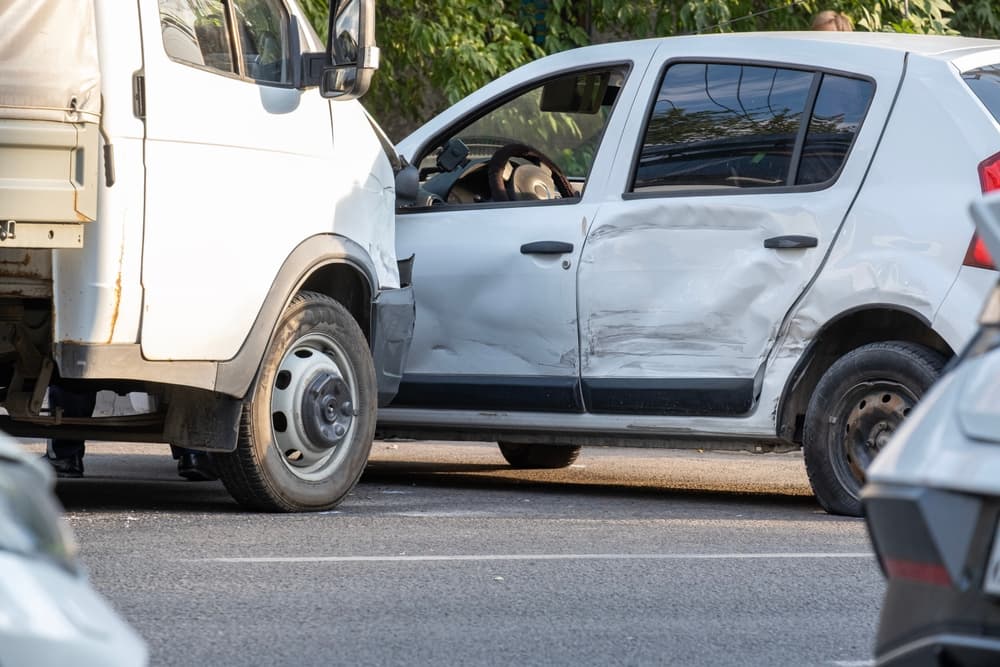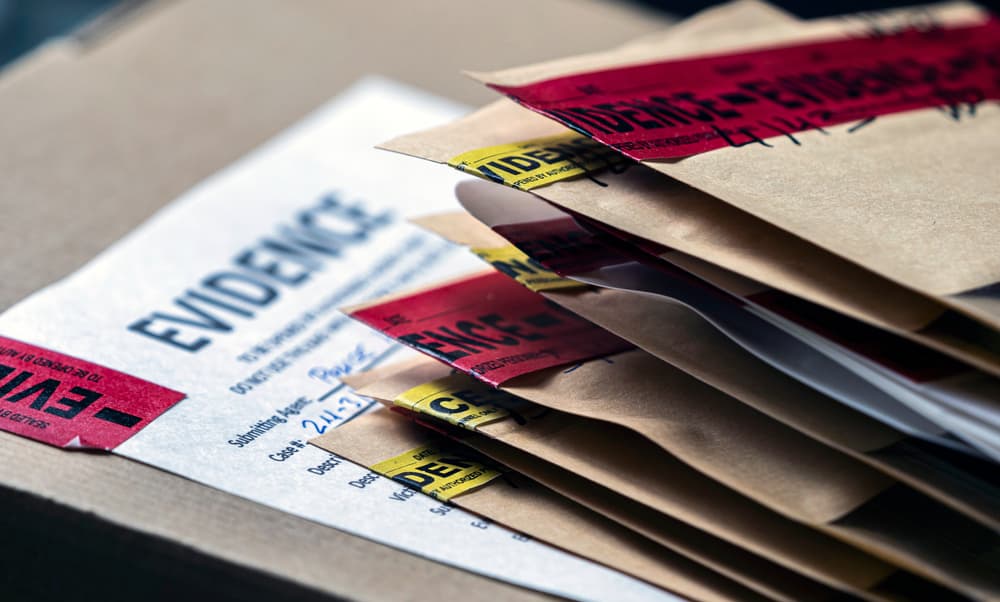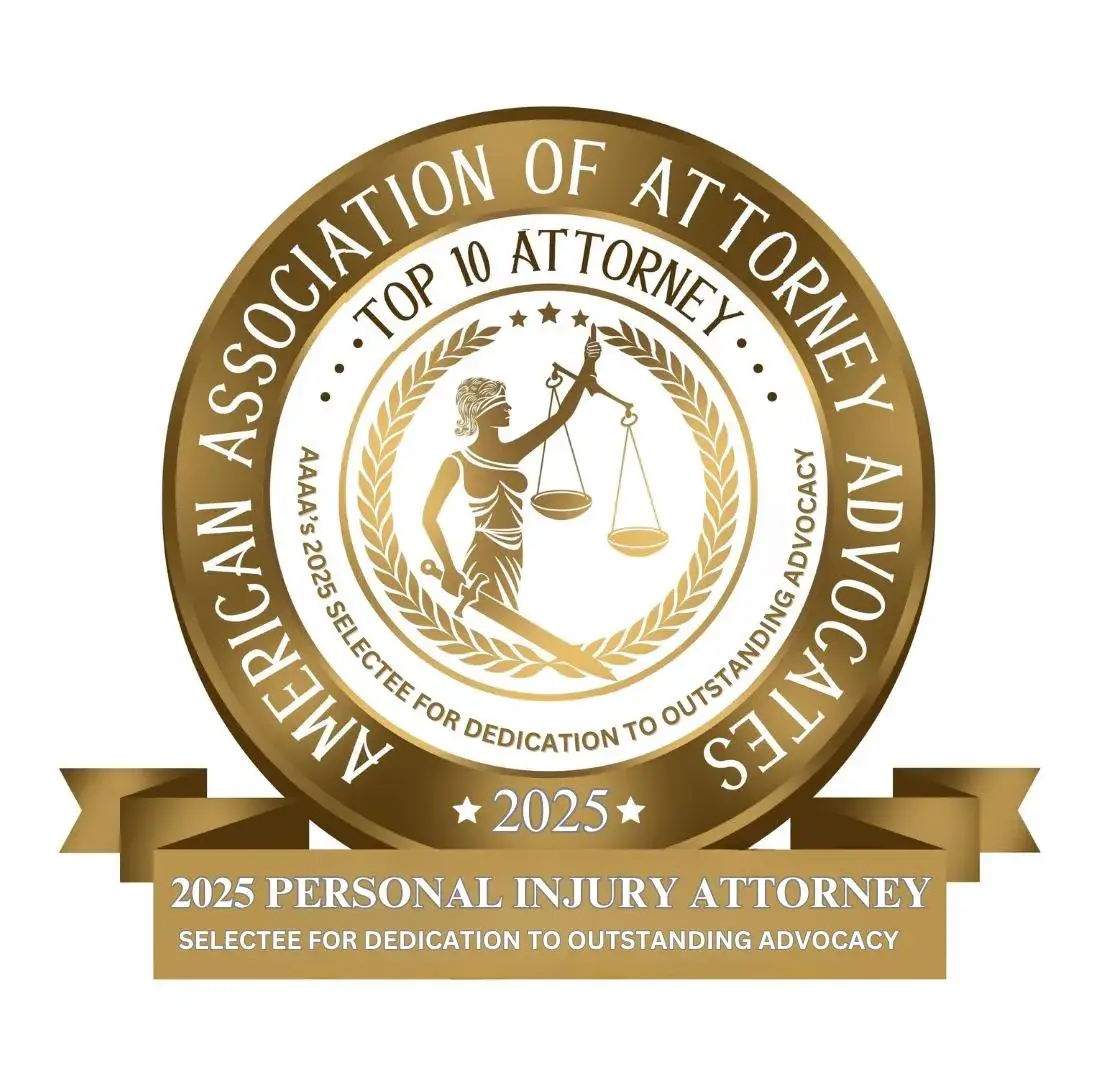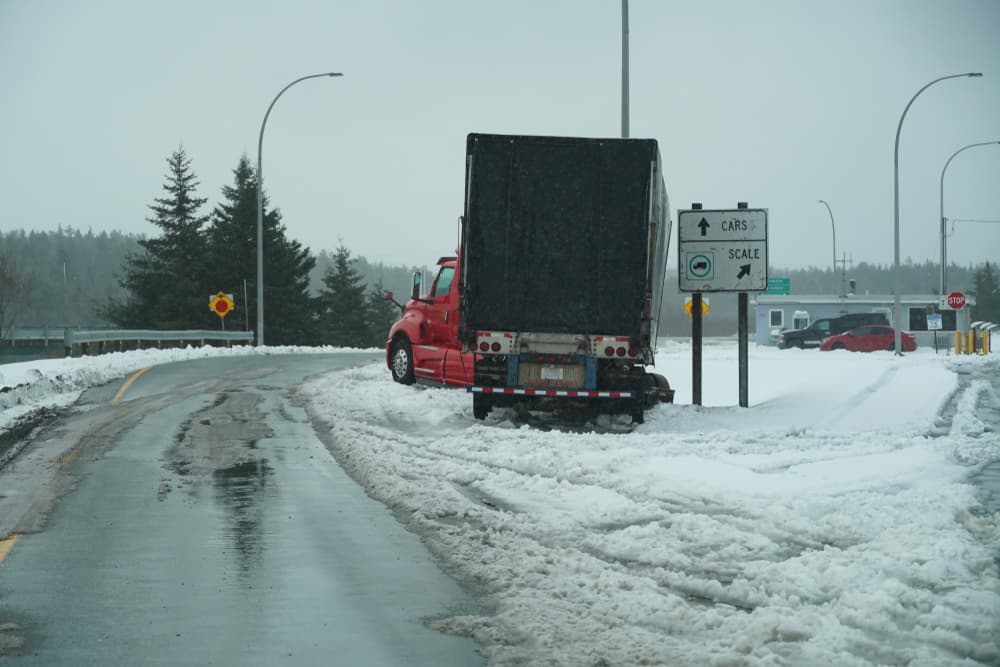
How Weather and Road Conditions Affect Truck Accident Liability
If you were injured in an accident involving a large commercial truck during bad weather, you might assume it was an unavoidable tragedy. However, under the law, adverse conditions like rain, snow, or fog do not automatically excuse a truck driver or their company from responsibility.
Professional truck drivers are held to a significantly higher standard of care than regular motorists. Federal regulations require them to take specific safety measures in hazardous weather, and their failure to do so can be a direct cause of a crash, making them legally liable for the injuries and damages that result.
Here’s a closer look at how weather and road conditions affect truck accident liability.
The “Act of God” Defense: A Common Misconception
One of the first things you might hear from a trucking company or its insurance adjuster is that the crash was an “Act of God.” This is a legal term, but it’s often misused to avoid responsibility. An Act of God is legally defined as an event caused by natural forces without any human intervention that could not have been prevented by reasonable care or foresight. Think of a sudden, unprecedented tornado that appears with no warning or a lightning strike that causes a tree to fall directly in front of a truck. These are truly unforeseeable events.
However, a heavy rainstorm in New Jersey, a snow squall in the Bronx during winter, or black ice on the New Jersey Turnpike are not typically considered Acts of God. Why? Because these are foreseeable events. We know it rains. We know it snows. Professional drivers and the companies they work for have a legal duty to anticipate these common weather conditions and adjust their actions accordingly.
Blaming the weather is often an attempt to shift focus away from the real question: Was there negligence? Negligence simply means that someone failed to act with the level of care that a reasonably prudent person would have exercised under the same circumstances. When it comes to commercial truck drivers, that standard of care is significantly higher.
The Higher Standard: A Professional Driver’s Duty in Bad Weather
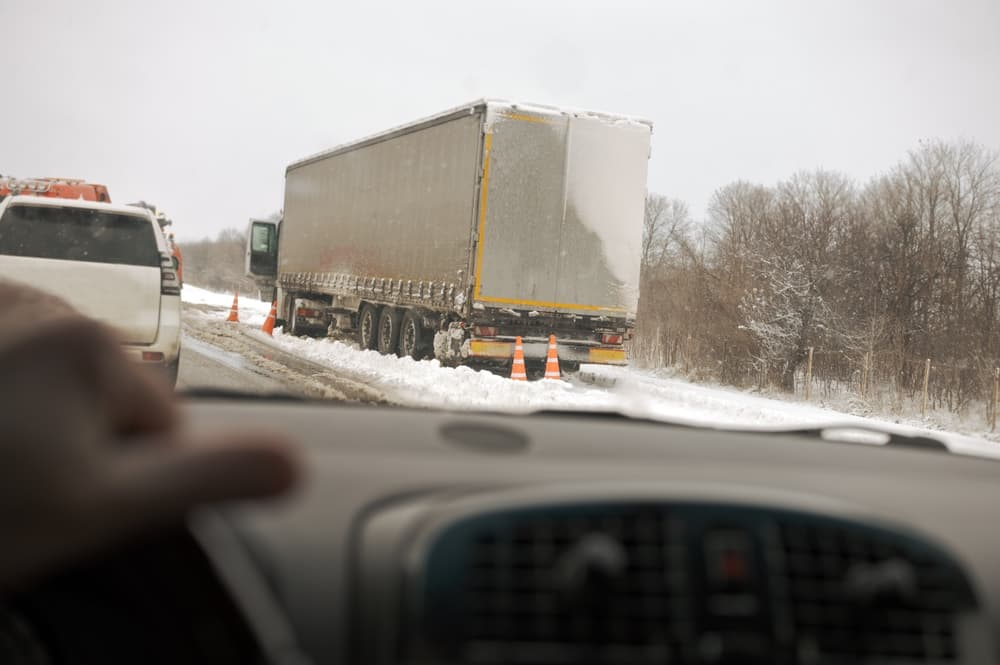
You and I, as regular drivers, are expected to be careful. We slow down in the rain and leave extra space in the snow. But commercial truck drivers are held to a much stricter, professional standard. They are licensed professionals who operate highly dangerous machinery. The Federal Motor Carrier Safety Administration (FMCSA), the agency that regulates the trucking industry, has very clear rules about driving in hazardous conditions.
FMCSA Regulation § 392.14 states:
“Extreme caution in the operation of a commercial motor vehicle shall be exercised when hazardous conditions, such as those caused by snow, ice, sleet, fog, mist, rain, dust, or smoke, adversely affect visibility or traction. Speed shall be reduced when such conditions exist. If conditions become sufficiently dangerous, the operation of the commercial motor vehicle shall be discontinued and shall not be resumed until the commercial motor vehicle can be safely operated.”
Let’s break down what this means for you.
- “Extreme Caution” is Not Optional: This isn’t just a suggestion. It is a federal mandate. A truck driver cannot simply drive the speed limit and claim they were being safe. If the safe speed for conditions on Route 4 during a downpour is 30 mph, then driving 50 mph—even if the posted limit is 55—can be considered negligence.
- Slowing Down is a Requirement: The regulation explicitly requires drivers to reduce their speed. A fully loaded semi-truck can take the length of a football field to come to a complete stop, even on dry pavement. On a wet or icy road, that distance increases exponentially. A professional driver is trained to understand this and must adjust their speed to create a safe stopping distance.
- Stopping is a Duty, Not a Choice: This is the most critical part of the rule. If conditions are “sufficiently dangerous,” the driver has a legal duty to pull over and stop. This could mean getting off the highway and waiting for the storm to pass, for the fog to lift, or for road crews to salt the ice. A driver who pushes through a dangerous blizzard or a torrential downpour because of a delivery deadline is not just taking a risk—they are actively violating federal safety regulations.
Imagine driving over the George Washington Bridge approach in Fort Lee during a sudden, blinding rainstorm. The traffic is dense, and visibility is near zero. A professional truck driver in that situation has a duty to recognize the danger and, if necessary, take the next exit and wait. Continuing on as if conditions were normal is a breach of their professional responsibility.
Beyond the Driver: The Trucking Company’s Responsibility
The driver behind the wheel is only one piece of the puzzle. The trucking company that owns the vehicle, creates the schedules, and employs the driver plays an enormous role in safety. When an accident happens in bad weather, the company’s actions (or inaction) are often a significant contributing factor.
Here are some of the key areas where a trucking company can be held liable:
- Improper Maintenance: Bad weather exposes faulty equipment. Brakes that are slightly worn might seem fine on a dry day but can fail completely on a wet road. Bald or poorly inflated tires have almost no traction on ice. Windshield wipers that are old and cracked won’t clear away a heavy downpour, blinding the driver. Defrosters that don’t work can lead to a dangerously iced-over windshield. A trucking company has a legal duty to properly inspect and maintain its fleet. If a maintenance failure contributed to a crash in bad weather, the company can be held responsible.
- Negligent Hiring and Training: Did the company hire a driver with a history of speeding or accidents in bad weather? Did they provide specific training on how to handle the truck in ice, snow, and heavy rain? A company that puts an untrained or reckless driver on the road is putting everyone in danger.
- Unrealistic Schedules and Pressure: This is a powerful and often hidden cause of weather-related accidents. Trucking is a business of deadlines. A company that pressures its drivers to “make the delivery no matter what” is encouraging them to break safety rules. If a dispatcher tells a driver to keep going through a dangerous storm to avoid being late, the company is creating the conditions for a disaster. The driver may feel their job is on the line, forcing them to choose between their livelihood and public safety.
- Negligent Dispatching and Routing: Modern trucking companies have sophisticated technology. They know where severe weather is and where it’s headed. A responsible company will reroute its drivers to avoid the worst of a storm or instruct them to stop. A company that negligently dispatches a driver directly into a known blizzard or hurricane without a plan is failing in its duty of care.
How Liability is Proven: The Search for the Truth
To prove that a truck accident was caused by negligence and not just the weather, a thorough and immediate investigation is critical. This isn’t something you should ever have to do on your own while you are trying to heal. It involves gathering crucial evidence before it can be lost or destroyed.
This evidence often includes:

- The Truck’s “Black Box”: Most modern trucks are equipped with an Electronic Control Module (ECM) or Event Data Recorder (EDR). This device records critical data from the moments before a crash, such as the truck’s speed, whether the brakes were applied, and engine RPM. This data can directly prove if a driver was going too fast for the conditions.
- Driver’s Logs: All commercial drivers must maintain an Hours of Service (HOS) log. This can show if the driver was fatigued from being on the road too long, which severely impairs judgment, especially in bad weather.
- Dispatch and Communication Records: Communications between the driver and the trucking company can reveal if the driver was being pressured to continue driving in unsafe conditions.
- Maintenance Records: These documents can show a history of poor upkeep on essential systems like brakes, tires, and wipers.
- Weather Data: Historical meteorological reports can establish exactly what the weather conditions were at the time and place of the accident, confirming whether they were foreseeable.
- Eyewitness Testimony: Accounts from other drivers who saw the crash can help paint a picture of the truck’s behavior leading up to the collision.
- Expert Analysis: An accident reconstruction expert can analyze all the evidence to scientifically determine how and why the crash occurred, often concluding that it was preventable despite the weather.
Putting these pieces together creates a clear picture of the truth. It allows us to show that while the snow was falling or the rain was pouring, the real cause of the crash was a human failure—a failure of a professional driver and their company to uphold their duty to keep the rest of us safe.
You have been through something traumatic. The physical pain, the emotional toll, and the financial stress can feel like an impossible weight. It is normal to feel overwhelmed and to wonder how you will ever pay your medical bills or make up for the income you’ve lost. But you do not have to carry this burden alone.
Understanding that the weather is not an automatic excuse for a truck driver’s negligence is the first step toward finding a path forward. Your pain is real, your losses are significant, and your story deserves to be heard.
Courage Defines Us. Justice Drives Us. Our Clients Inspire Us.
When you have suffered injuries after a devastating truck accident, you need more than just a lawyer; you need a dedicated team of advocates who will stand in your shoes, understand your pain, and fight for you with courage and conviction. At Maggiano, DiGirolamo & Lizzi, P.C., we represent the person next door—the hardworking individuals and families from our communities in Fort Lee, Hackensack, the Bronx, and beyond who have been harmed by someone else’s negligence.

We know that these cases are complex and that trucking companies and their insurers will do everything they can to blame the weather to avoid paying what they owe. We are here to level the playing field. Our team of highly experienced personal injury attorneys has a deep understanding of federal trucking regulations and a proven track record of achieving multi-million dollar verdicts and settlements for our clients. We are a rare firm that handles not only complex truck accident claims but also the workers’ compensation claims that may arise from them, ensuring we can maximize the recovery for our clients.
We work on a contingency fee basis, which means we do not get paid unless we win your case. You will never receive a bill for our time. Our focus is solely on getting you the justice and compensation you need to heal and rebuild your life.
If you or a loved one has been injured in a truck accident, please do not assume the weather is to blame. Let us help you find the truth. Contact us today at (201) 585-9111 or through our online form for a free, confidential consultation. We are here to listen, to guide you, and to fight for you.



